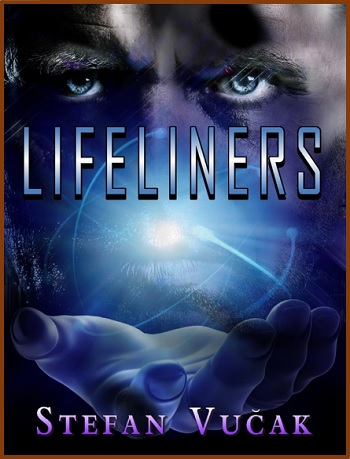An interview with Thomas Anderson, Editor in Chief, Literary Titan.
Lifeliners follows Nash as he navigates a tumultuous future with the next evolution of human’s, lifeliners. What was the inspiration behind Lifeliners and how did that develop as you were writing?
Lifeliners began as an idea for a short story on a long flight from Europe to Melbourne, Australia, my home. I always have my notebook handy, never knowing when inspiration would strike. Tired of browsing through inflight entertainment, I began jotting down notes to flesh out a story about an emerging new human able to draw energy from someone by touching them. From previous reading and watching documentaries, I knew that birthrates in Western countries have been falling for a while, accompanied by growing sterility. Could this be a product of our high-pressure technological lifestyle and high density urban living? I decided to develop this theme into a story. Nature decided that lifeliners were the answer to who would over time replace normal human beings. Of course, people would not be prepared to simply let lifeliners take over, but that only added to the story’s depth.
Well, I wrote the short story, posted it on my website, and I thought I was done with it. Time to finish what was then my latest book project Legitimate Power. Once I had it published, I began reviewing ideas for a new book – and kept coming back to lifeliners. It was one thing to write a short story, but fleshing it out into a full-length novel was not something I had in mind, wanting to write another contemporary political drama/thriller. But the bug had bitten me and the characters clamored to have their say. Lifeliners began to haunt my days. The only way I would have peace was to write the damned book, and I was glad that I did.
I really enjoyed Nash’s character and the relationship he has with Cariana. What were some important themes for you when creating these characters and their relationship?
Nash was a lifeliner in a social environment that is growing increasingly hostile, fanned by propaganda by governments the world over – it was easy to blame lifeliners for the problems people had. His natural instinct was to survive, and if possible, secure his future, provided no one found out he was a lifeliner. Having someone to love, raise a family, was an obvious and normal goal, but one he was not sure he could achieve. Would it not be better to wall himself in from social contact and ride out whatever troubles might lay ahead? That is how he lived for a few years, especially after thugs murdered his first love, Sally. Meeting Cariana, not a lifeliner, generated normal human feelings, and he ignored his inner warnings and allowed himself to become ensnared by her, which regrettably led to all the subsequent unpleasantness. Having found out that remaining walled in did not work, he needed to change things, not only for himself, but other lifeliners as well. This led to a gradual transformation of his world view and as a person.
Falling in love with Cariana, cool, beautiful and accomplished, was easy. Her work as a geneticist alarmed Nash, knowing that she could expose him, and if the relationship was to mature, he would have to reveal himself to her anyway and face possible rejection. For Cariana, starting to fall for Nash, she faced a psychological burden having her brother killed by a drunken lifeliner. It embittered her against all lifeliners. She recognized the sick nature of her attitude, but she could not help herself. When she learned that Nash was a lifeliner, the image of him as a dashing prince was shattered, and she hated him, yet she could not extinguish her love for him. I believe the interplay of emotions and feelings the two had for each other, and the emotional baggage both carried, hopefully made them more real, something readers would expect in any couple.
I enjoyed the realistic portrayal of science in this story. Did you conduct any research for this book, or were these things you were thinking about?
Although the idea of drawing bioelectromagnetic energy from another person is a fictional foray, I spent a lot of time researching material for Lifeliners, which reinforced the information I already had about the complexity of human biochemistry. The loss of our ability to synthesize pyruvate into leucine and valine is a fact, as are their functions. However, I have taken some liberty when I suggested that lifeliners can also synthesize vitamin C. But who knows what nature may have in store for us in the future. Although Lifeliners is a work of fiction, I always thoroughly research every one of my contemporary novels to ensure the validity of my facts and that I do not stray too far from what is scientifically possible with my science fiction.
What is the next book that you are working on and when will it be available?
Having just completed Lifeliners, and busy marketing it, I need to take a break and recharge my creative battery. It usually takes me a couple of months before I start nurturing ideas, seeing which of them can be turned into a novel. However, this does not mean that I have stopped writing. As a matter of fact, I just added a new short story to my collection Doorways of the Mind and I have another that I will write within the next few days. Until the urge overcomes me to tackle a new novel, I will be spending some of my time doing book reviews and editing for other authors.
LIFELINERS, a gold award winner!
The post An interview with Literary Titan appeared first on Stefan Vucak.


